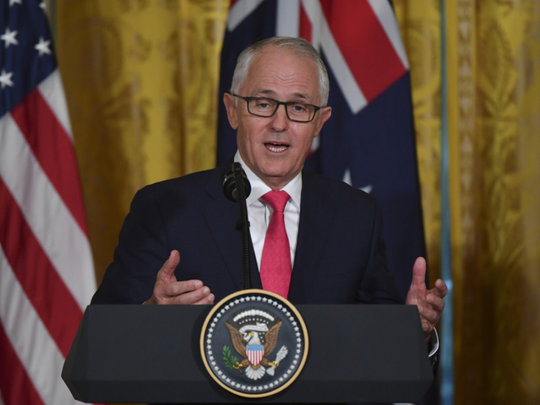
In the lead-up to United States President Donald Trump hosting Australian Prime Minister Malcolm Turnbull, much is being said about points of contention in the current bilateral relationship, and about awkward moments in past interactions between the two leaders. But there should be no doubt that bigger issues are at stake. The visit ought to prompt serious reflection on Australia’s relationship with the US and Australia’s place in the world. The Australian PM and the others should ask themselves three questions.
First, are things in the US as bad as they seem? Dysfunction in Washington is the stuff of legend. The centrifugal forces that afflict the US predate Trump. Maybe, for all the tweets, this is just politics as usual.
No. The current crisis is broader and deeper than those of the recent past, and nascent trends have accelerated in a dangerous and unpredictable fashion. Trump’s unfitness for office is advertised daily and is exceeded by the pliancy of those around him. Beyond personality alone, on a host of issues the administration is pursuing bad policy. Most consequentially for Australia, in foreign affairs, the administration is abdicating US leadership, hollowing out the state department and diminishing US credibility.
The state of the US economy provides no reassurance. Deregulation and tax cuts have been warmly received by corporate America. But the administration’s approach relies on trickle-down economics, over-hyped projections for growth and economic nationalist rhetoric that is utterly ahistorical. It’s unlikely that politics and economics can remain out of sync for long. Recent corrections may be the first sign that Wall Street optimism is being mugged by reality.
More grave still is the harm being done to institutions. Levels of tolerance for self-dealing are at an all-time high just as mechanisms of accountability are in abeyance. Checks and balances survive in the form of special counsel Robert Mueller’s investigation into Russian interference in the 2016 election, and in the persistence of an independent press. The disparagement of both by the US president and his loyalists attests to the novelty of our times.
Second, will this situation improve any time soon? The current moment is bleak; the future looks worse. The Robert Mueller investigation will be determinative — supposing that Trump does not intervene to end it. Such a move is but one route to constitutional crisis. If Mueller’s findings are gentle on Trump, he and his apologists will be emboldened. If Mueller finds Trump and his associates complicit in enabling Russian interference, or of related offences, they will push back hard. The consequences of either outcome are damaging.
It’s difficult to say how these developments will play out. More than 40 Republican lawmakers are not sticking around to find out, declining to compete in the 2018 midterm elections. A Democratic “blue wave” may help restore some semblance of normality. But for a long time hence, Americans will be preoccupied cleaning up the mess that the administration is making — or messing things up even more.
Third, if things are bad, and are not going to get better, what does this mean for Australia? Australians should realise the urgency of reconsidering some of the taken-for-granted assumptions that inform our foreign and domestic policy alike.
Australia’s security and prosperity are grounded in the post-war, US-led world order. The US’ inability or unwillingness to maintain leadership will give rise to uncertainty. Negotiating those choppy waters will require sound strategy and skilled diplomacy. Challengers to US influence are at the ready. Democracy is on the back foot worldwide. Australia’s other oldest, closest friend — the United Kingdom — has also engaged in self-destructive behaviour, in the form of Brexit. Australia’s foreign policy makers face a generational challenge.
The travails of US democracy also provide lessons for Australia domestically. US elites have been at best negligent in allowing civic life to decay. Institutions that ought to bolster the health of a democracy — education, the media and electoral systems — have become battlegrounds. The ideal of an informed citizenry prepared to play its part in good government has been overwhelmed by moneyed partisanship and a social media environment too permissive of agents of influence at home and abroad.
Australians should avoid this fate. Leaders should care about political and social cohesion. Investments in civic education should ensure that young Australians can discern political fact from fiction, and are apprised of the case for liberal democracy as the best (least worst) form of government.
Turnbull’s visit is a critical opportunity for the premier and for all Australians to absorb that the US is at a fulcrum point. Australia should start thinking about how to secure its interests in the uncertain future that awaits.
— Guardian News & Media Ltd
Peter Romaniuk is associate professor of Political Science at John Jay College of Criminal Justice and the Graduate Center, the City University of New York.










